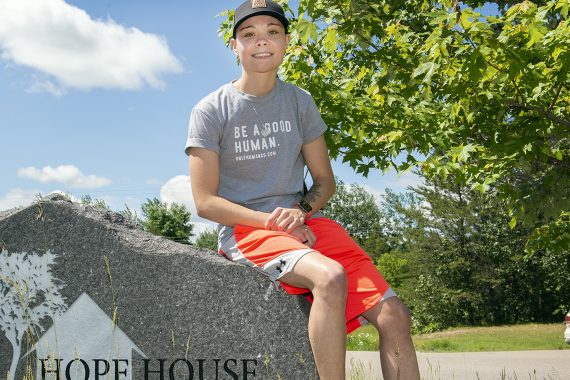
Donna Velishek outside the Hope House in Grand Rapids, Minnesota.
Bemidji State psychology senior Donna Velishek first developed a passion for helping those struggling with addiction and recovery when she started working as an intake coordinator at Pear Lake Women’s Program, a women’s rehab center in Grand Rapids, Minnesota.
Hailing from Deer River, Minnesota, Velishek quickly learned that she loved – and was good at – the work and was encouraged to pursue a psychology degree at Bemidji State by her supervisor, an alumna. The choice was easy because Velishek had already once intended to attend Minnesota’s premier North Woods university.
“I went to Itasca Community College for two years when I graduated high school with plans to attend Bemidji State after that,” she said.
Amanda Longie, assistant professor of social work and a professor for the addictions certification program, was crucial to Velishek’s success.
“As a student you can tell that Amanda really wants you to succeed in what you’re doing. She works with you in a way that makes it almost impossible not to,” Velishek said. “She’s accessible, flexible and is always there if you have questions or need help. Amanda gave me the support and encouragement to stay motivated and keep growing in this field.”
Velishek feels between the classroom work and the hands-on internship experience, she is well prepared for her future after her licensed drug and alcohol counseling certification.
“This program is set up to teach you exactly what you’ll be doing in the field. Students also leave feeling well-prepared to take the certification exam because we get all of the tools and knowledge we need before we graduate,” Velishek said.
Bemidji State’s addictions counseling program is also quick to adapt to a growing and ever-changing field, she said. The American Society of Addiction Medicine criteria changed within the last few years, but faculty were quick to educate students in the program on these changes.
“We had to adapt and learn the different criteria in class, and the counselors I work with right now at Pear Lake Women’s Program had to stay informed as well,” Velishek said. “I was able to give them some of my information and handouts from classes.”
Velishek hopes to move into a counselor role at the Pear Lake Women’s Program. She wants to help the organization grow.
“If I could do it all over again, I honestly would. A lot of people can benefit from this program,” Velishek said. “There is a high need for licensed alcohol and drug counselors and this program can help people with that passion, while giving them the confidence to be good at what they’re doing.”
Contact
Link
- Bemidji State University
- Addictions Certificate
- BSU Department of Social Work
- BSU Department of Psychology
2022-B-127
